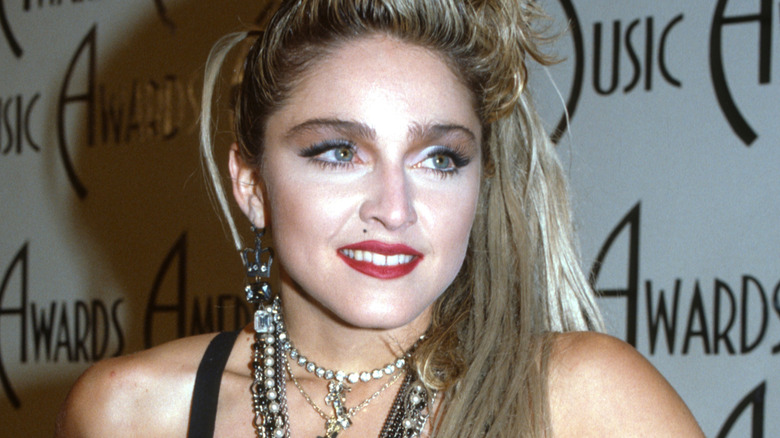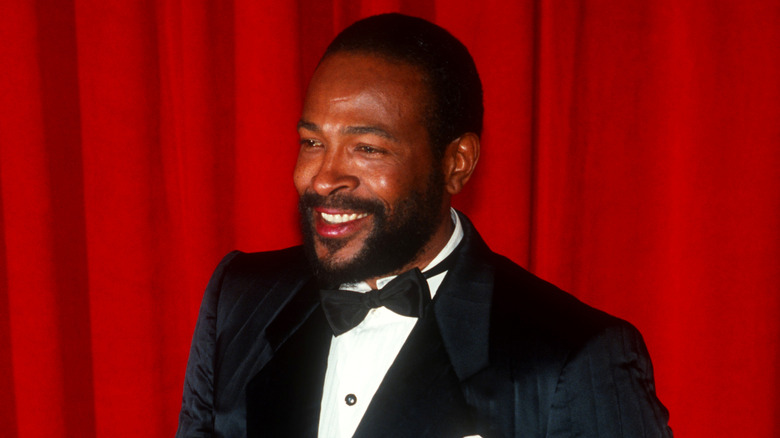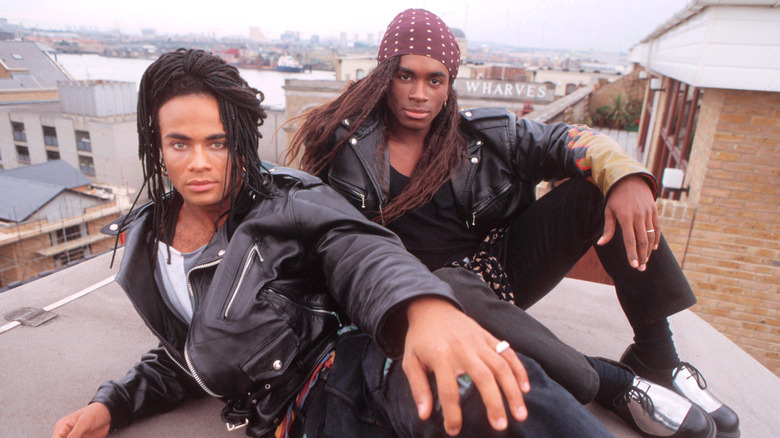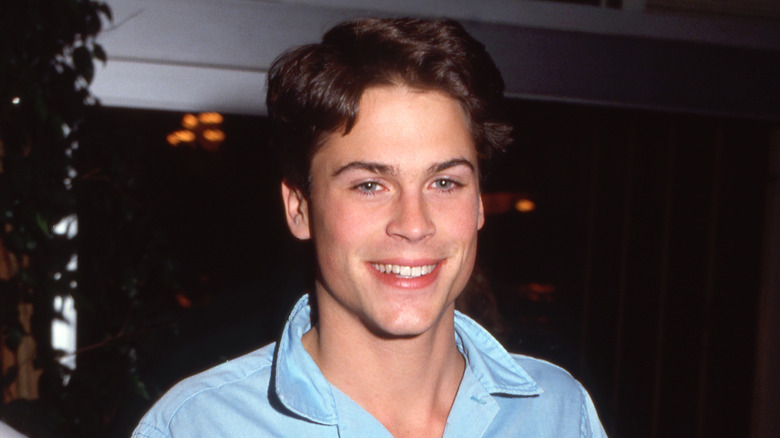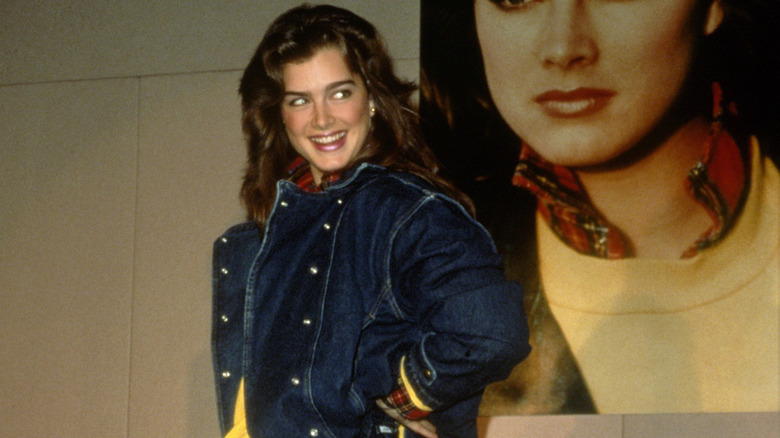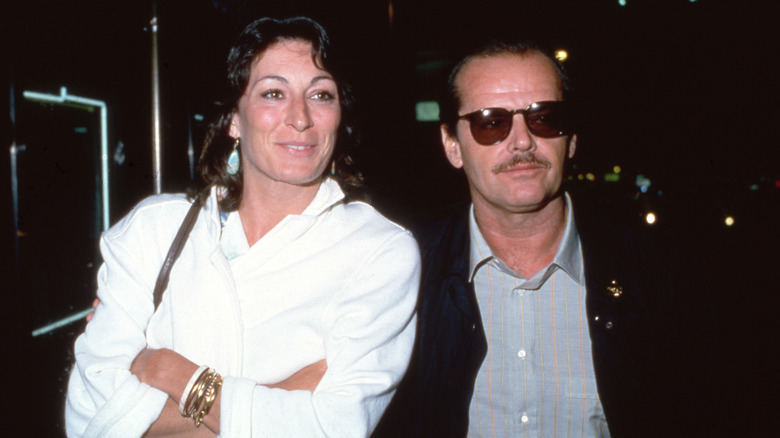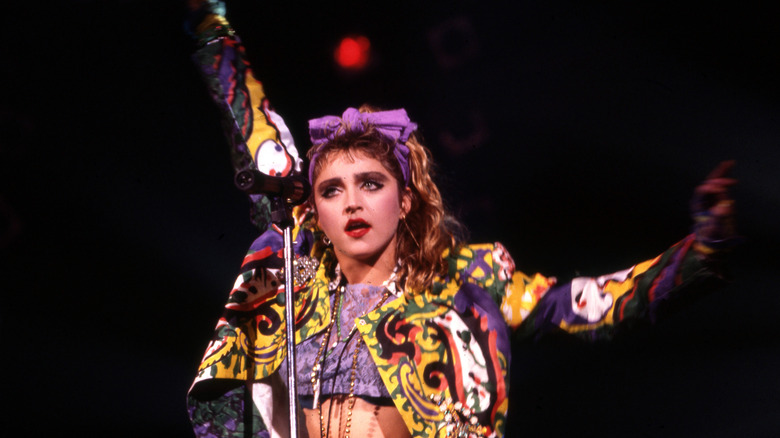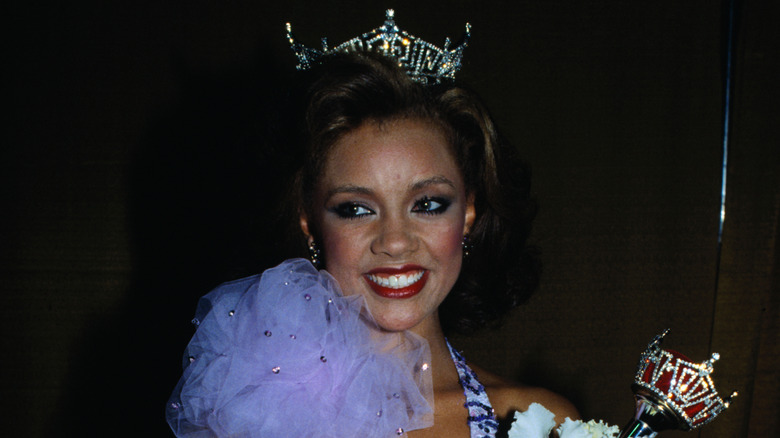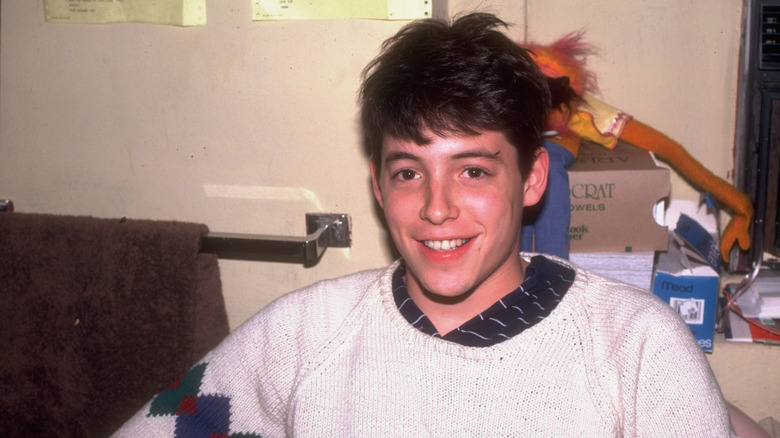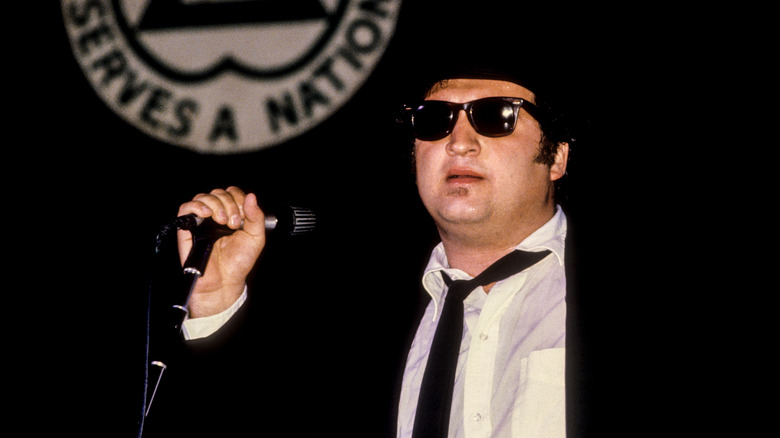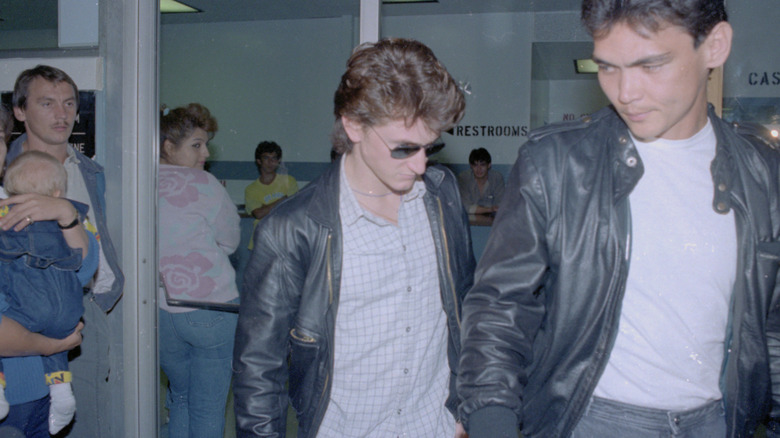10 Celebrity Scandals That Completely Rocked The 1980s
The 1980s were a happening time in the celebrity world, where many new stars were breaking on to the scene and navigating through the fast lanes of fame. Often, that proved to be a double-edged sword, with the same spotlight that catapulted them to superstardom also leaving them exposed to immense public scrutiny. Full-blown scandals, therefore, were a frequent occurrence during that era of showbiz. From shocking arrests and secret affairs to career-threatening missteps and public meltdowns, the '80s delivered controversy after controversy that the media and audiences lapped up eagerly. All the way from the worlds of pageantry to music, cinema, and everything in between, high-octane events unfolded across the entertainment industry.
Some headlines were more tragic than others, such as the unexpected murder of Marvin Gaye or drug-fueled death of John Belushi, but each carried a sensationalism that resounds even decades after they happened. Yet others, in their own bizarre way, set the tone for modern celebrity-obsessed tabloid culture to develop. Case in point: Rob Lowe's infamous steamy video that was by and large the progenitor for sex tape scandals in Hollywood, to the point that the "Class" star joked that he practically "invented" the sex tape (via SiriusXM). Other celebrities were just caught in the muck for having ideas much ahead of their time and over the years, pop history has looked at their so-called scandals with much kinder eyes. Here are 10 celebrity scandals that completely rocked the 1980s.
Music icon Marvin Gaye was murdered by his father
The music world stopped in its tracks when one of its brightest stars, Marvin Gaye, was murdered in 1984. The most surreal detail of the story, perhaps, was that the "Let's Get It On" hitmaker was killed by none other than his own father. The shooting took place on April 1, just one day short of Gaye's 45th birthday, when the legendary musician tried to intervene during a fight between his parents at their Los Angeles home. Marvin Gay Sr., who was a church minister and shared a difficult relationship with his son, shot him twice. "I thought it was loaded with blanks or BBs. I didn't know any bullets was in the gun," Gay Sr. later said (via The Washington Post). He was jailed but later got probation and eventually died in a nursing home.
An important cultural icon whose influence went all the way back to '60s music, Gaye was crucial to the rise and early success of Motown Records, with songs like "Ain't That Peculiar" and "I Heard It Through the Grapevine" to his name. Later hits like "Sexual Healing" cemented his place as one of the defining voices of R&B and turned him into a Grammy-winning artist. Remarkable as his career was, Gaye's personal life was in turmoil behind the scenes owing to substance abuse and mental health issues. Toward the end of his life, he was reportedly paranoid about being poisoned and his impending death.
Milli Vanilli fell from grace after being outed as frauds
Milli Vanilli were one of the hottest musical acts of the '80s — and also the biggest sham. The slick-looking, high-power duo of Rob Pilatus and Fab Morvan had an entire generation tapping to their beats with chart-topping pop hits like "Girl, I'm Gonna Miss You" and "Baby, Don't Forget My Number." So when it was discovered that Pilatus and Morvan weren't actually singing but only lip-syncing the songs people so loved, the backlash was immediate and immense. Dramatically enough, the truth was outed during the duo's live performance for MTV in 1989, when the track for "Girl You Know It's True," one of their most famous numbers, began glitching and exposed them as frauds.
While Milli Vanilli's lip-syncing controversy didn't put them out of favor among audiences, it did bring their credibility into question within the industry and mark the beginning of the end of one of the music scene's most successful duos. It was eventually revealed that session singers Charles Shaw, Brad Howell, and John Davis were actually the voices behind their songs — a setup that was orchestrated by renowned record producer Frank Farian. The hoax had repercussions for the music group beyond sensational headlines calling them out. Milli Vanilli had to give up their 1990 Grammy win for best new artist in the event of the fiasco and live with fallen reputations for the rest of their careers.
Rob Lowe found himself in the middle of a sex tape scandal
Rob Lowe was on a steady rise in the '80s as one of the key members of the infamous Brat Pack when he hit a roadblock in 1988. A sex tape surfaced, which showed Lowe engaging with two women, one of whom was alleged to have been underage at the time. The incident, filmed at a hotel in Atlanta during the Democratic National Convention, was leaked to the press, marking one of Hollywood's first such celebrity sex tape scandals and made a massive media splash. Sensational as the footage itself was, what stood out most shockingly was that one of the girls was only 16 years old — a fact Lowe said he was not aware of when doing the deed. He faced legal heat from the minor's family, but the case was eventually settled out of court.
In what can only be termed a surreal turnaround, Lowe took this potentially career-ending scandal head-on and came forward to address it in public, even spoofing it on stages like "Saturday Night Live." He later credited it as a watershed moment that helped him turn his life in the fast lane around and live more mindfully. "It's the best thing that ever happened to me," he said (rather controversially) in his SiriusXM interview. "It got me sober, sober got me married ... I don't think any of that happens without going through that scandal."
An underage Brooke Shields posed for a controversial jeans ad
In 1980, Brooke Shields was the face of one of the most talked-about — and controversial — advertisement campaigns of the decade. Only 15 years old and riding high on the success of her smashing breakthrough in "Pretty Baby," Shields posed for Calvin Klein and unforgettably delivered the denim brand's infamous commercial taglines: "You want to know what comes between me and my Calvins? Nothing." At first glance, it could have passed for just another edgy fashion ad. But given Shields' age and the suggestive phrasing, it quickly drew accusations of sexualizing a minor and caused a media uproar. The commercial was banned on several television networks, including CBS, as press headlines amplified the ethically ambiguous tone of the scandal.
"I didn't think it was about underwear or sexual in nature. I was naive," Shields told Vogue decades later, reflecting on her teenage understanding of the scandal and the outrage it sparked. "I think the assumption was that I was much more savvy than I ever really was." Interestingly enough, the debacle did little to dent either Shields or Calvin Klein's reputations, and notwithstanding the wide backlash, the campaign came out on the other side with resounding success, remembered as one of the brand's more iconic ad outings. As Shields put it: "It set the tone for decades." While Shields' expansive acting work went on to transcend the '80s moment, it remains an inseparable part of her legacy.
Anjelica Huston and Jack Nicholson's split marked the end of an era
Long before the advent of tabloid gossip and PR-sanitized breakups, Anjelica Huston and Jack Nicholson lived out a romantic split that felt like the closing chapter of one of Hollywood's most dramatic love stories. In 1989, their on-again, off-again relationship — which had spanned the better part of 17 years — ended with a resounding crash brought on by Nicholson's adulterous escapades that had resulted in an illegitimate child. That the "As Good as It Gets" star had been unfaithful to Huston was hardly the most intriguing detail about the story, considering that he had garnered a bit of a reputation for his roving eye all throughout their years as the industry's ultimate power couple.
But Nicholson fathering a child with actor Rebecca Broussard seemed to have been the final nail in the coffin for Huston. "There's only room for one of us women in this picture, and I am going to retire from it," she told Nicholson the night he told her about Broussard's pregnancy, as mentioned in her memoir "Watch Me" (via Vanity Fair). Although Nicholson asked Huston to stay despite his infidelity, she bowed out of the situation. A few years later, she married Robert Graham, with whom she remained until his death in 2008. Time seems to have somewhat softened the bitterness between the former couple, with Huston once telling The Guardian that in retrospect, she "can laugh about it."
Madonna's music video for Like a Prayer rocked the Vatican
Madonna's "Like a Prayer" marked a major moment in the '80s — not just musically but also politically. Released in 1989, the song was unimaginably bold and blended themes of race, religion, and sexuality in a way so sensational that a controversy was but expected. The music video accompanying the song was what stirred the pot most, with Madonna putting forth a symbolic performance that involved dancing in front of burning crosses and kissing a seemingly evangelical Black figure. Much as it pushed the envelope of pop music ahead by miles, "Like a Prayer" struck the wrong nerve with religious groups that took issue with the video's supposedly blasphemous imagery.
The song even rang through the Vatican, with Pope John Paul II publicly denouncing it and calling for a boycott of the singer. Financially, too, the scandal proved to be a loss-making vehicle for multiple parties, with Pepsi pulling the multi-million-dollar commercial featuring Madonna's controversial song. The singer, however, refused to back down in the face of all the backlash coming her way. "I think I'm offending certain groups, but I think that people who really understand what I'm doing aren't offended by it," she said in a statement at the time, per ET Online. Her judgment was spot on, considering that "Like a Prayer" only took Madonna's star power to new heights and, decades later, is regarded highly for its musical and cultural significance.
Vanessa Williams lost her pageant crown following a photo scandal
In the '80s, Vanessa Williams made history by becoming the first Black woman to be crowned Miss America 1984. With her landmark victory, the 21-year-old seemed to have personified a powerful breakthrough moment for the previously exclusive pageant world. But all of it came crashing down less than a year into her reign, when news of an impending publication of some explicit photographs of her surfaced. Before making her mark in pageantry, Williams had worked with a photographer for whom she had posed in the nude. She had allegedly not been made aware that the photos, which featured her with another woman, would ever be identifiable beyond silhouettes or ever made public.
A media storm ensued over the publication in Penthouse magazine — with a sensational headline that read "Miss America: Oh, God, She's Nude!" — and Williams was faced with immense pressure to give up her crown, which she ultimately did. The former Miss America had to relinquish her title a year after her historic win. "I wish I could retain my title," she said in her resignation speech, per The New York Times. "I feel at this time I should expend my energies in launching what I hope will be a successful career in the entertainment business." Williams' ordeal was tragic, but she refused to let it bog her down, charting a dignified rise as a successful singer and actor. A redemption of sorts occurred in 2015, when the Miss America Organization apologized to Williams for its handling of the scandal.
Matthew Broderick caused a fatal car crash
Matthew Broderick was ruling the '80s after "Ferris Bueller's Day Off" cemented his place as one of the hottest youth icons of the decade. But merely a year after the release of his career-making film, Broderick found himself in the middle of a major controversy that put his eternally good boy image at stake. In August 1987, while vacationing in Northern Ireland with his then-girlfriend Jennifer Grey, Broderick steered his car into the wrong lane and caused a head-on collision with another vehicle that was carrying a mother and daughter, both of whom were killed on the spot. The fatal accident made an instant media splash, putting the actor pair — who also suffered injuries — under an intensely critical spotlight.
"I don't remember the day," Broderick told authorities at the time (via The New York Post). "What I first remember is waking up in the hospital, with a very strange feeling going on in my leg." He spent weeks in recovery, as legal repercussions awaited him outside the hospital doors. Although he managed to bypass jail and was only charged for careless driving, the trauma of the incident haunted him deeply to the point that Broderick, by and large, has refrained from publicly discussing it in too much detail. He eventually made contact with the victims' family, which softened toward him over the years, with a spokesperson for the actor saying, "There is no ill will — not any sort of anger. The family is seeking some sort of closure."
John Belushi's death put a spotlight on Hollywood's drug culture
John Belushi's death in 1982 hit the entertainment industry like a lightning bolt. The 33-year-old star of productions like "Saturday Night Live" and "The Blues Brothers" was found unresponsive at the infamous Hollywood party haunt of Chateau Marmont following a lethal drug overdose. Although the cause of his death was initially disputed, the truth became clearer as details about the chaotic final hours of his life began spilling out into the public. Belushi had been staying at the Sunset Boulevard hotel for days before his death, spiraling out of control amidst a steady swirl of substances and displays of erratic behavior, which left even his close friends like Robert De Niro and Robin Williams concerned.
The final blow came in the form of speedball, a dangerous mix of cocaine and heroin. Shocking as Belushi's death was, it wasn't entirely unexpected, considering the circumstances of his drug-addled lifestyle. "John was always the guy who went a little too far and wanted to stay too long at the party," his wife Judy Belushi-Pisano told People decades later. "It seemed okay, but then he got into things like cocaine and that is not a sustainable drug." Given that he was one of comedy's foremost talents at the time, Belushi's death made for sensational front-page news and brought the dangers of life in Hollywood's glamorous fast lanes into greater focus.
Sean Penn was involved in a string of violent assaults
The '80s established Sean Penn as a bona fide Hollywood bad boy — not simply because he headlined the 1983 namesake "Bad Boys" but also for his involvement in a string of violent incidents. His off-screen persona came to mirror the intensity of his acting roles to the extent that Penn was unhesitant in throwing punches around, even if it called for legal trouble later. Journalists and paparazzi were his frequent targets, with one of his earliest clashes taking place in 1985 when he assaulted journalists in Nashville for trying to photograph his then-girlfriend Madonna. He came out on the other side with only a small fine and a suspended jail sentence, but his tarnished reputation set the tone for his scandal-making behavior all through the '80s.
By 1987, the consequences of his actions caught up with him (somewhat), when he was arrested for the assault of an extra on the sets of his film, "Colors." The man in question, Jeffrey Klein, reportedly tried to photograph Penn when the actor turned violent and things escalated. Penn received a 60-day jail term and spent a few weeks behind bars. The actor was also ordered to undergo a psychiatric evaluation for his temper. "He needs to and does understand that incidents like this are inescapable, and he can control and will control them," his attorney said at the time, conveying the star's regrets, per the Los Angeles Times.
